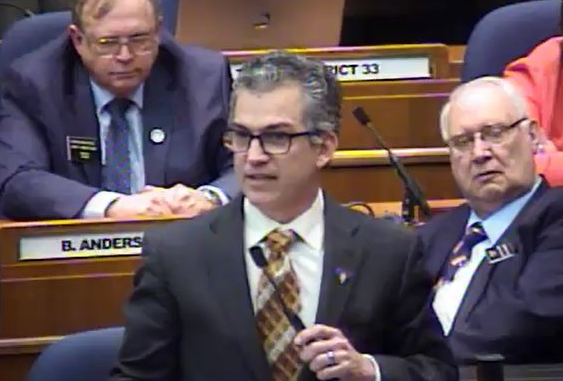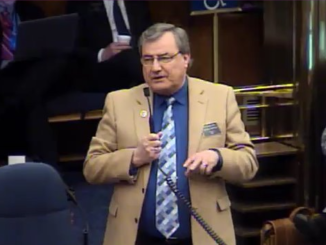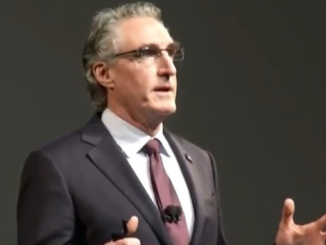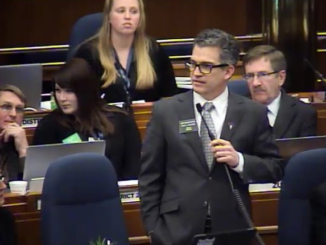
Note: The following remarks were given in the final moments of
the 66th Legislative Session on April 26, 2019 by Rep. Rick Becker (R – District 7).
Video of this floor speech is found at the conclusion of the transcript.
Mr. Speaker, Members of the Assembly, I stand to explain my No vote on SB 2015, the Office of Management and Budget bill. There were several concerns including the increase in spending in section 1, the increased spending in section 2, and several grants in the subsequent sections.
Why the No vote? This as well as all appropriation bills have to pass – what can possibly be accomplished? I didn’t vote No as an attempt to get attention, or out of obstinance, and not because of naïve idealism. It’s because of three simple assertions.
The first is that our system of a representative democracy is a good one, and that means we were elected to do what we individually believe is right, rather than what other individuals or groups want.
The second is that our only true power as citizen legislators is our individual vote. We ought not permit that power, however small, be compromised.
The third is the very nature of principles. We must show consistency in our convictions. If we’re not consistent– adhering to a principle only when convenient, the principle ceases to be, devolving into merely a loose guideline.
We all agree that an implicit responsibility of our office is the prudent and careful spending of the taxpayers’ dollars. Many of us also state that we believe limited taxation and free market principles lead to greater prosperity for all citizens, and that government should be constrained to a role in which it can carry out only its necessary functions. By voting No, I am staying true to a platform of limited government, lower taxes, and personal responsibility.
Some facts to consider
Since 2009:
- State spending increased by 160 percent (take note – a 3 percent per year inflationary increase would only amount to a 38 percent increase). We are currently spending $2.5 billion more per year than if we had only increased spending to an annualized inflationary 3 percent.
- State spending per capita increased by 122 percent, which eliminates the argument that the spending was required due to population increase. We are spending $2.1 billion more per year than if we had increased per capita spending to an annualized inflationary 3 percent.
- South Dakota, a state very much like North Dakota, but without the oil revenue, increased per capita state spending by 32 percent over the last 10 years. Ten years ago our spending was $33 million less than South Dakota. Now we spend well over $2 billion more than South Dakota per calendar year.
If we did not continue to increase spending as we just did, we could provide remarkable tax relief. We have been saying for years that the citizens’ number one concern is their property tax. With our overspending in the range of $2 billion to $2.5 billion per year, and total property tax revenue at about $1 billion per year, we can easily accomplish the single best thing for our taxpayers in one fell swoop by abolishing the property tax.
After eliminating the property tax, $1 billion to $1.5 billion in relative overspending remains, so that’s a great opportunity to reduce income tax rates to zero percent. If we do that, we still have $600 million to $1.1 billion left. In fairness, I want to account for the increase of $200 million in required spending on Medicaid due to FMAP changes. After removing that minor factor, $400 million to $900 million remain in extra spending after accomplishing the single greatest benefit to taxpayers of any state in the union over the last 150 years.
One might say that will never happen. But why? It only requires believing in principles, acting according to those beliefs, and looking to the welfare of the entire state. It all can be done with the little power we have in our individual vote and being consistent in applying the principles in which we believe. Consider that just as we reduce our budget when forced by lower revenues, we can do it when forced by being true to principle.
I believe we allowed ourselves to fall victim to incrementalism. Like the frog in a pot of water brought slowly to a boil, we voted yes on this bit and that bit. We were convinced of this plea and that for increased funding. We were convinced of myriad new, critical needs. And perhaps without fully appreciating the enormity of it, we have been part of one of the biggest growths of any state government in the history of the United States.
That, Mr. Speaker, is why I voted against this spending bill. As we finish this session, I believe it will be important for us to take stock in what we’ve done, and how each of us can use the power of our individual vote next session.
PLEASE LIKE & SHARE!
Rick Becker on the 2019-2021 ND State Budget
This is my speech in the last minutes of the 2019 legislative session. I am referring to the final spending bill, however, my remarks pertain to all of the spending we’ve done over the last 10 years. It’s 4 1/2 minutes, and you should know the information I bring to light here.
Posted by Rick Becker for North Dakota on Wednesday, May 1, 2019
Sources:
- https://www.legis.nd.gov/assembly/66-2019/bill-index/bi2015.html
- https://www.facebook.com/beckerfornd/videos/1146255038832256/





